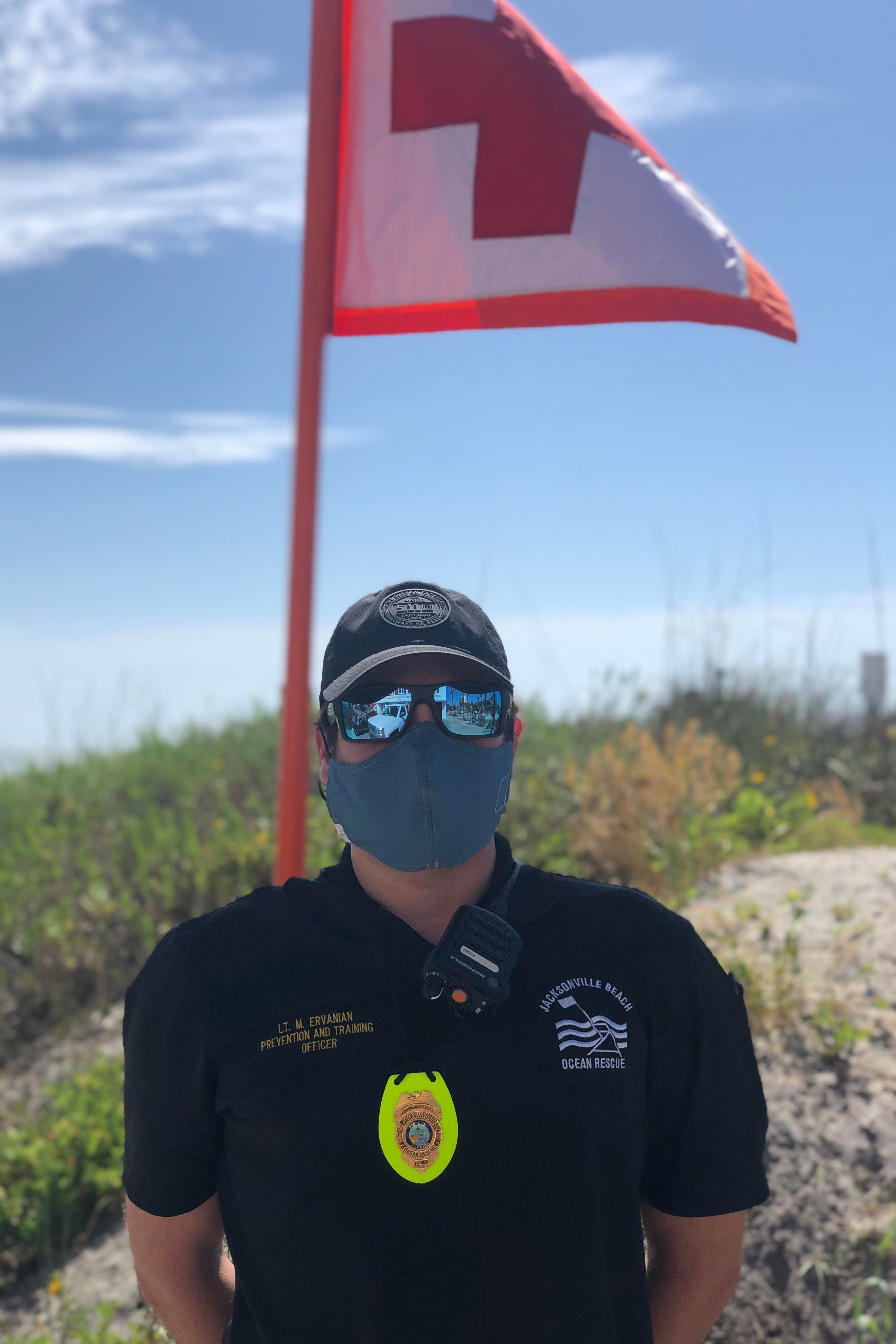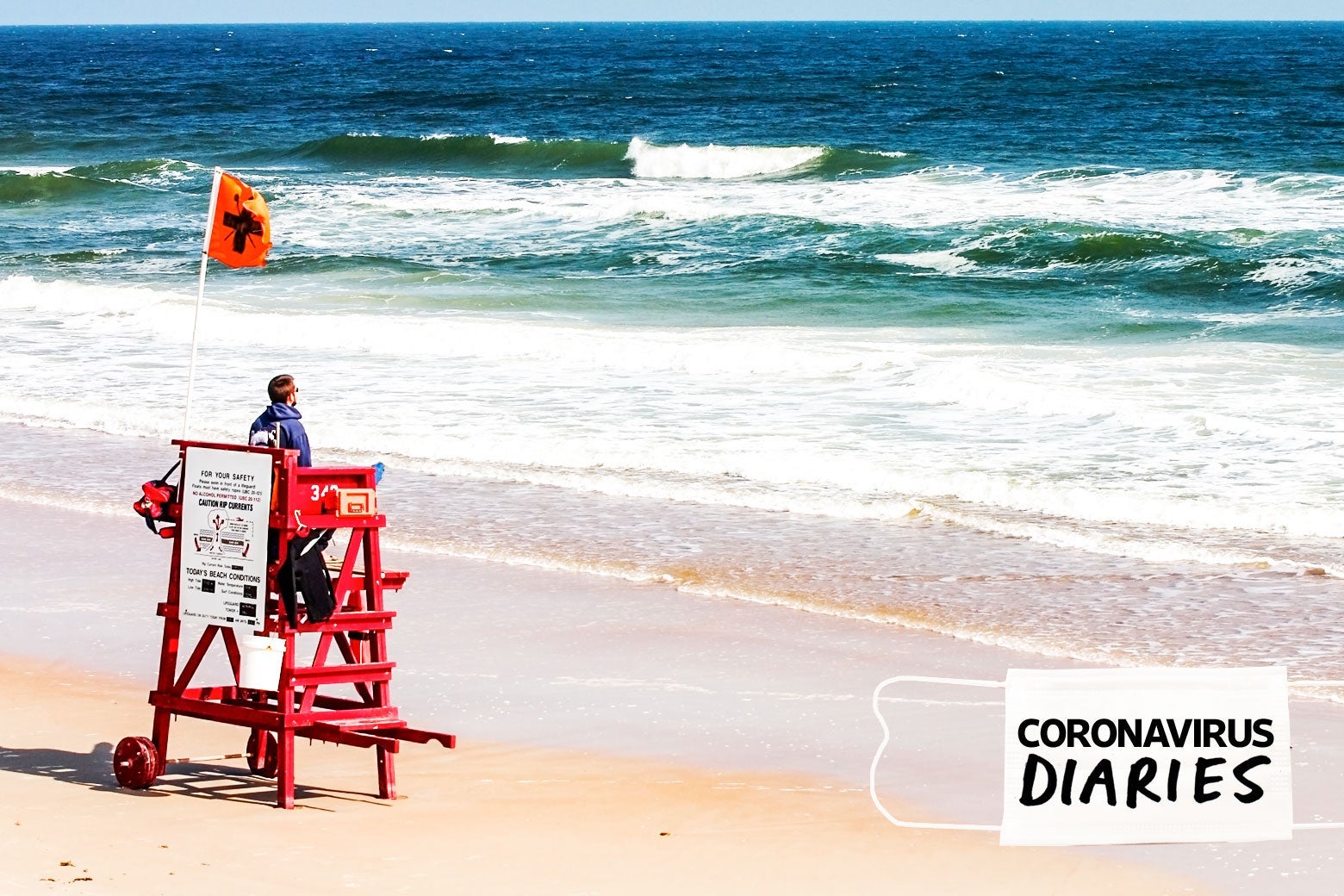Coronavirus Diaries is a series of dispatches exploring how the coronavirus is affecting people’s lives. For the latest public health information, please refer to the Centers for Disease Control and Prevention’s website. For Slate’s coronavirus coverage, click here.
This as-told-to diary from Maxwell Ervanian, a prevention and training officer for the Ocean Rescue Division in Jacksonville Beach, Florida, has been edited and condensed for clarity from an interview with Heather Schwedel.
We are currently back to full open, meaning that the beach is open with no limitations or restrictions. We’re kind of back to what I would almost consider a spring break time, getting ready for summer. The beach is back in full swing like the shutdown never happened.
When the beaches shut down, they were closed to all activity, and it was a very weird time. It was something that I’ve never seen in my 25 years living at the beach—I’m 25 now, and I’ve been lifeguarding since I was 16. I grew up here at the beach, born and raised. I would go to the beach before school, go to the beach after school, go to the beach if I had nothing else to do, and I chose to live at the beach and stay at the beach.
In January or in February on very, very cold blistering days, yeah, the beach is empty, the water may be a little rough, but there’s still always somebody—one or two people here and there. Or even on these beautiful December days when it’s 30 degrees outside, there’s still always somebody walking on the beach, have their dogs on the beach. But to see every restaurant closed, every bar closed, no car activity, no activity on the boardwalk, no activity in sight except for some birds laying on the sand, was really such a shocking reflection of the current situation.
Before we closed down, we had over 26 rescues in one week. We rescued 26 people from dying in one week in early March, and that’s in very early spring. That really showed that this was not just a COVID-19 public-safety issue, but because every place was shut down, the stay-at-home orders were in effect, and no one had anything to do but to go to the beach.
When the beaches shut down on March 20th, it was middle of spring break. We were basically assisting the law enforcement agency with people who would be going into the water or onto the beach, and advising those people to leave the beach—the beach is closed, the water is closed. The police departments handle enforcement, so lifeguards can just tell and advise.
First the beach reopened with restrictions. Then really recently, on May 5th, the beach was open fully with no limitations and no restrictions 24/7. You could come to the beach and you could do whatever you wanted. You could just lay, you could sunbathe, you could sit, you could fish. Our police department is still on the beach—I wouldn’t say the word enforcing, but maybe reminding people to stay conscious of social distancing and COVID-19 protective measures.

We see people wearing masks, and then when they get to their spot on the beach, they take their mask off. All of my lifeguards are required to wear masks when they are dealing with patient care. They have been recommended to wear a mask at all times, but they definitely don’t have to.
We’ve been very fortunate. We have not had to perform CPR at all so far since we reopened. Mouth-to-mouth is more of a movie thing. We use a bag valve mask and we hook that up to an oxygen device. I’ve been around lifeguarding since I was 6 years old, and I’ve never heard of mouth-to-mouth being performed.
The water rescue is the biggest risk of making contact with a possible COVID-19 patient. Whenever a lifeguard goes from a tower into the water, they’re not wearing any PPE, because there is no PPE able to be worn into the water that would protect them. Usually by the time the lifeguard is out of the water, the responding vehicle with additional lifeguards is on scene, and the lifeguard who brought the patient into shore out of the water would step aside and allow another lifeguard in a mask and gloves to take over.
My lifeguards aren’t scared. They’re chomping at the bit to get back to work and want to work, because this is what they enjoy doing. I’ve not heard a single bit of, “I’m afraid of helping someone because I don’t want to get COVID.” I expected one or two lifeguards not to come back, but really absolutely none of that. If anything, I saw the complete opposite. They’re ready to work, to put their life at risk to save someone else. That’s something that I’m very proud of.
We’re surprised to see that the beach is not as crowded as we imagined it to be. My hypothesis is that the city is starting to reopen stores and work, and people can’t just drop what they’re doing to go to the beach. Kids are still dealing with home school. They’re not fully out of school yet. Even with COVID-19, I think once school is done, summer is officially started, people are getting back into the groove of working again, then people are going to start taking off and going to the beach.
The groups on the beach appear to be families or close friends, so people that they’ve been with for the last couple of months. I think if people continue to do what they have been doing, they will be in a good place. People are kind of keeping to themselves—their little spot, their little area. It’s not very close together. But as Memorial Day comes up or Fourth of July and everyone is at the beach, that will be a little bit harder to do. We’ll see.
